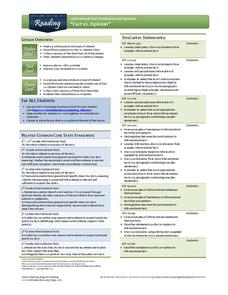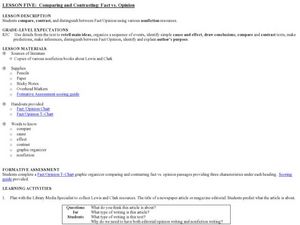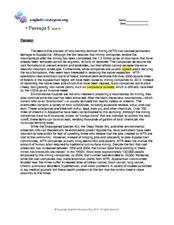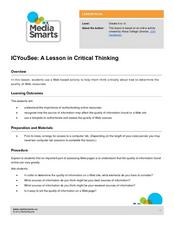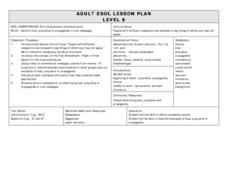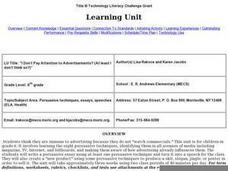Curated OER
Fact vs. Opinion (Part II)
How can you tell the difference between fact and opinion? Using newspapers, learners determine which articles contain statements of fact, and which articles reflect the writer's opinion. The lesson plan includes a discussion format and a...
For the Teachers
Fact vs. Opinion
Many informational texts are written as factual, but can your learners determine when an opinion is presented as fact? Have your kids read several articles on the same topic and record the statements that contain either facts or...
Curated OER
Comparing and Contrasting: Fact vs. Opinion
Elementary schoolers investigate nonfiction stories by analyzing facts and opinions. They read nonfiction stories about the Lewis and Clark expedition. Pupils utilize a T-chart to list the facts and opinions on opposite sides, and then...
Curated OER
Facts vs. Opinion (Part 1)
Provide pairs of learners with a three-page Fact vs. Opinion packet. The first page of the packet provides a definition of these terms and an opportunity for guided practice. Partners then share their ideas to complete the practice...
PBS
Facts vs. Opinions vs. Informed Opinions and their Role in Journalism
Do reporters write about what they see, or what they think? Examine the differences between investigative writing and opinion writing with a instructional activity from PBS. Learners look over different examples of each kind of...
Curated OER
Fact and Opinion: How to Tell the Difference
Students explore reasoning by completing a worksheet activity in class. In this fact vs. opinion lesson, students identify the differences between a personal opinion and something that is factually true. Students identify several...
Scholastic
Reading Skills Profile
Assess your young learners' reading skills, from sounding out words to general comprehension and identifying facts vs. opinions, with this excellent worksheet. The resource also includes a goal-setting worksheet that focuses...
Curated OER
Reading Comprehension 5: Level 10
Whether used as a reading comprehension assessment, as the basis of a mini-lesson on reading strategies, or as extra practice, this exercise will prove to be valuable because of the answers and explanation key that accompanies the...
Curated OER
Fact vs. Opinion
Young scholars explore fact versus opinion in reading material. They listen to sentences and use hand signals to identify if the sentences are facts or opinions. After reading a story, they vote on sentences for facts and opinions and...
Curated OER
The Value of Facebook
Does Facebook actually have any value? Find out what the New York Times thinks by reading this informational article. Learners use the 10 guiding questions to aid them as the read the provided article regarding the value of Facebook. Two...
Curated OER
In Legal Limbo
Newspapers are great learning tools. They act as a conduit for current events, reading comprehension, and critical thinking. Here, pupils read a New York Times article regarding US immigration law under the Obama administration and...
Curated OER
Amelia Earhart: Fact Or Myth
In this reading and history worksheet, students research Amelia Earhart and make lists of what they believe to be facts and what they think are myths, legends and theory. No information or examples are given on this page.
Curated OER
Turning Literature into News
Students examine the newspaper. In this writing purposes lesson, students read the newspaper and discuss the purpose: to inform, entertain and persuade. Students identify facts and opinions. Students write an article and discuss acts of...
Curated OER
Robinson vs Barlow and the White Indians: A Trial
Students judge the actions of Nathan Barlow and the White Indians by putting them on trial in the classroom. They discuss how public opinion can change based on time. Students judge the White Indians based on the early 1800's not on today.
Curated OER
ICYouSee: A Lesson in Critical Thinking
Stress the importance of authenticating online resources and understanding the sources of websites' information with this activity. Using a Web-based activity, the lesson prompts young learners to think critically about determining the...
Curated OER
Persuasive Writing: Creating Book Reviews
By reading and analyzing examples of persuasive text, students can get a better idea of how to form their own essays.
Curated OER
Institution vs. Individuals
Students examine and evaluate how the U.S. government dealt with the Native American populations during westward expansion. They complete a class KWL chart, take notes during a teacher-led lecture. Students read about the Battle at...
Curated OER
What is Diabetes?
Students examine basic information about diabetes and related vocabulary words. They explore various health websites, complete a worksheet, discuss the worksheet answers and discuss diabetes myths vs. facts.
Curated OER
Ida Tarbell: Hysterical Woman vs. Historical Facts
High schoolers examine journalism and its different styles. In this effective communication instructional activity students create an editorial message and articulate an article.
Curated OER
Fossil Fuels vs. Alternative Fueling Systems
Fourth graders brainstorm the differences between the fossil fuels that people use in their transportation now and what they could use to minimize greenhouse gas emissions. They use a variety of techniques from webquests to writing...
Curated OER
We Wish You a Merry Something, America
In this we wish you a merry something, America worksheet, 8th graders read or listen to a paragraph explaining that the term merry Christmas is not politically correct in America. Students discuss 4 warm up topics, complete...
Curated OER
Can You Find a Solution?
Students explore the topic of public conservation. In this Florida panthers lesson, students read a scenario about the endangered panther and collaborate to plan a way to protect the panther population. Students also participate in a...
Curated OER
Agree To Disagree
Students discover their own talents and preferences and determine how they apply to the world of work with a group activity. They express their choice and discuss their positions.
Curated OER
I Don't Pay Attention to Advertisements
Sixth graders examine the eight persuasive techniques, identifying them in all avenues of media including magazine, TV, Internet, and billboards, and making them aware of how advertising already influences them. They write an essay using...



